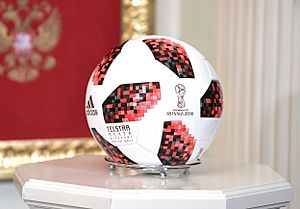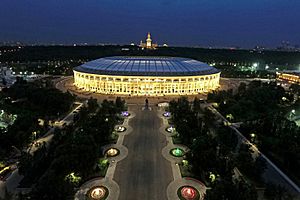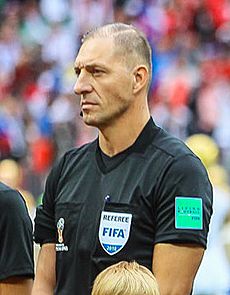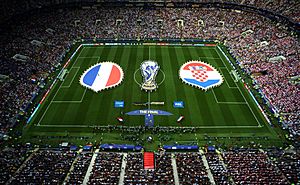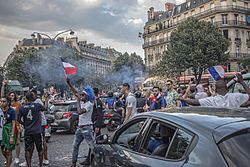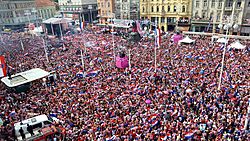2018 FIFA World Cup final facts for kids
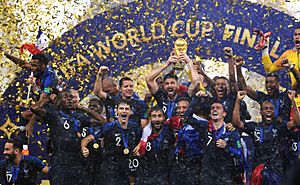
Players of the France national football team lifting the World Cup trophy
|
|||||||
| Event | 2018 FIFA World Cup | ||||||
|---|---|---|---|---|---|---|---|
|
|||||||
| Date | 15 July 2018 | ||||||
| Venue | Luzhniki Stadium, Moscow | ||||||
| Man of the Match | Antoine Griezmann (France) | ||||||
| Referee | Néstor Pitana (Argentina) | ||||||
| Attendance | 78,011 | ||||||
| Weather | Partly cloudy 27 °C (81 °F) 51% humidity |
||||||
|
← 2014
2022 →
|
|||||||
The 2018 FIFA World Cup final was the last match of the 2018 FIFA World Cup, a big football tournament for national teams. It was held in Moscow, Russia, on July 15, 2018. The final game was played between France and Croatia.
Before the final, France won their group with two wins and a draw. They then beat Argentina, Uruguay, and Belgium to reach the final. Croatia also won their group with three wins. They then defeated Denmark and Russia in penalty shoot-outs. After that, they beat England to get to the final.
About 78,011 fans watched the game live in the stadium. Over a billion people watched it on TV around the world. The referee for the match was Néstor Pitana from Argentina.
France scored first with a goal by Mario Mandžukić in the 18th minute. This was an own goal, meaning he accidentally kicked it into his own team's net. It was the first own goal ever in a World Cup final! Ten minutes later, Ivan Perišić scored for Croatia, making the score 1–1.
Soon after, France got a penalty when the referee decided Perišić had touched the ball with his hand. This decision was made after checking with the video assistant referee (VAR), which was new for the World Cup. Antoine Griezmann scored the penalty, putting France ahead 2–1 at half-time.
In the second half, France scored two more goals. Paul Pogba scored in the 59th minute, and Kylian Mbappé scored from outside the box in the 65th minute. Mbappé became only the second teenager to score in a World Cup final, after Pelé in 1958. Croatia scored another goal when Mandžukić took advantage of a mistake by France's goalkeeper, Hugo Lloris. The final score was 4–2 to France.
France won their second World Cup title. Their first win was in 1998, when they hosted the tournament. Griezmann was named the best player of the final match. Croatia's captain, Luka Modrić, won the Golden Ball award for being the best player of the whole tournament. This final was the highest-scoring World Cup final since 1966.
France's manager, Didier Deschamps, had also been the captain of the 1998 winning team. He said it was amazing to experience this success again. Croatia's manager, Zlatko Dalić, congratulated France but disagreed with the penalty decision. Both teams later played in the UEFA Euro 2020 tournament, reaching the round of 16.
Contents
What was the 2018 World Cup Final?
The 2018 FIFA World Cup was the 21st time the World Cup football tournament was held. It took place in Russia from June 14 to July 15, 2018. Russia automatically qualified as the host country. Other teams had to play in qualifying games to earn their spots.
In the main tournament, 32 teams were split into eight groups of four. Each team played against the others in their group once. The top two teams from each group moved on to the knock-out stage. The team that won the previous World Cup in 2014 was Germany. However, they were knocked out early in the group stage in 2018.
France had won the World Cup once before, in 1998. They also finished second in 2006. The 2018 final was the first time Croatia reached a World Cup final. Their best result before was reaching the semi-finals in 1998. Many experts called Croatia's team a "golden generation" of players. This included stars like Luka Modrić, Ivan Rakitić, and Mario Mandžukić.
The official ball for the final was called the Telstar Mechta. "Mechta" means "dream" in Russian. It was a red version of the Adidas Telstar 18 ball used in the knockout stage.
Where was the Final Played?
The final match was played at the Luzhniki Stadium in Moscow. This stadium was chosen as the main venue for the World Cup final. It also hosted six other matches, including the opening game.
The Luzhniki Stadium first opened in 1956. It was once the national stadium for the Soviet Union and then Russia. It has hosted many important football matches. It was also home to several club teams over the years.
The stadium is very large, holding up to 81,006 people. For the World Cup, its capacity was slightly reduced to 78,011. Before the World Cup, the stadium was closed for big renovations. The seats were moved closer to the field. The old artificial turf was replaced with natural grass. The outside of the stadium was kept the same because it is historic. The roof was also updated with new lighting. The renovation cost a lot of money, about €341 million. The stadium officially reopened in November 2017.
How France Reached the Final
| Opponent | Result | |
|---|---|---|
| 1 | 2–1 | |
| 2 | 1–0 | |
| 3 | 0–0 | |
| R16 | 4–3 | |
| QF | 2–0 | |
| SF | 1–0 |
France was one of the top teams expected to win the 2018 World Cup. They qualified by finishing first in their group. In the main tournament, they were in Group C with Australia, Denmark, and Peru.
France won their first game against Australia 2–1. Antoine Griezmann scored a penalty, and then Australia scored one too. France won with an own goal from an Australian defender. Their second match was against Peru, which France won 1–0. Kylian Mbappé, who was only 19, scored the goal. This made him France's youngest goalscorer in a major tournament. This win meant France was sure to move on to the next stage. Their last group game against Denmark ended in a 0–0 draw, but France still won their group.
In the round of 16, France played against Argentina. It was a thrilling game that France won 4–3. Griezmann scored another penalty early on. Argentina then scored two goals to take the lead. But Benjamin Pavard scored a great goal to tie it up. Mbappé then scored two quick goals, making it 4–2. Argentina scored one more, but France held on to win.
France then played Uruguay in the quarter-finals and won 2–0. Goals came from Raphaël Varane and Griezmann. They moved on to the semi-finals against Belgium. France won this game 1–0, with a goal from defender Samuel Umtiti after a corner kick. This win sent them to the World Cup final!
How Croatia Reached the Final
| Opponent | Result | |
|---|---|---|
| 1 | 2–0 | |
| 2 | 3–0 | |
| 3 | 2–1 | |
| R16 | 1–1 (aet) (3–2 p) | |
| QF | 2–2 (aet) (4–3 p) | |
| SF | 2–1 (aet) |
Croatia finished second in their qualification group. They had to play in a special play-off game to get into the World Cup. They beat Greece to secure their spot. In the main tournament, Croatia was in Group D with Argentina, Iceland, and Nigeria. This was seen as a tough group.
Croatia won their first game against Nigeria 2–0. Then, they had a big win against Argentina, beating them 3–0. They scored three goals in the second half. Croatia finished first in their group by beating Iceland 2–1.
In the round of 16, Croatia played Denmark. The game ended 1–1 after extra time. Croatia won the game in a penalty shoot-out 3–2. Their goalkeeper, Danijel Subašić, made three great saves.
Next, Croatia faced the host team, Russia, in the quarter-finals. This game was also a draw, 2–2, after extra time. Croatia won another penalty shoot-out, 4–3. This made them only the second team in World Cup history to win two shoot-outs in one tournament.
Croatia's semi-final match was against England. England scored early from a free kick. But Croatia fought back. Ivan Perišić scored to make it 1–1. Then, Mario Mandžukić scored in extra time, giving Croatia a 2–1 win. This meant Croatia had won three games after falling behind, and all three went into extra time! They were ready for the final.
Before the Match
The referee for the final was Néstor Pitana from Argentina. This was his fifth match as a referee in the tournament. He was also the referee for the opening match, which is a big honor. His assistants were Hernán Maidana and Juan Pablo Belatti, also from Argentina. The video assistant referee (VAR) system was used for the first time in a World Cup final.
Before the game, there was a closing ceremony. Famous singers like Will Smith, Nicky Jam, and Era Istrefi performed the official tournament song, "Live It Up". An opera singer, Aida Garifullina, sang a Russian folk song. Even former football star Ronaldinho made an appearance.
Many important people attended the match. This included Russian president Vladimir Putin, French president Emmanuel Macron, and Croatian president Kolinda Grabar-Kitarović. Both teams used the same starting players they had in their semi-final matches.
The Match: First Half
The match started at 6 PM local time. It was a warm day, around 27°C (81°F). About 78,011 fans were in the stadium. Over a billion people watched on TV. There was even a small thunderstorm during the game.
Croatia started the game very strongly. They controlled the ball and attacked more in the first 15 minutes. But France scored first in the 18th minute. They got a free kick, and Antoine Griezmann kicked the ball into the penalty area. Croatia's Mario Mandžukić tried to head the ball away, but it went into his own goal! This made it 1–0 to France. It was the first own goal in a World Cup final.
France's N'Golo Kanté received the first yellow card of the game. A minute later, Croatia tied the score. Ivan Perišić was fouled, and from the free kick, the ball came to him. He shot it low into the corner of the goal, making it 1–1.
Soon after, France got a corner kick. The ball went into the penalty area, and France's players asked for a penalty. They said Perišić had touched the ball with his hand. The referee, Néstor Pitana, checked the play using the video assistant referee (VAR). After a few minutes, he decided to give France a penalty. Griezmann took the penalty in the 38th minute and scored, putting France ahead 2–1.
Another yellow card was given to France's Lucas Hernandez. Croatia had a chance to score just before half-time, but the ball went wide. The first half ended with France leading 2–1. France had only one shot on goal in the half, but they scored two goals! Many experts debated if the free kick and the penalty for France were fair decisions.
The Match: Second Half
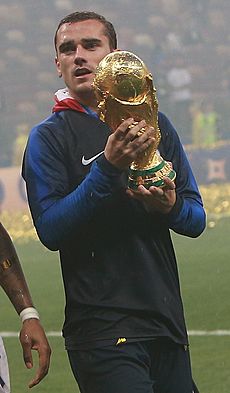
The second half started with a small delay because some people ran onto the field. Croatia started the second half just as strongly as the first. Croatia's Ante Rebić had a good shot, but France's goalkeeper, Hugo Lloris, saved it with one hand.
France had a chance in the 52nd minute when Kylian Mbappé ran with the ball and shot, but the goalkeeper saved it. France then made a substitution, bringing on Steven Nzonzi.
France increased their lead in the 59th minute. Paul Pogba passed to Mbappé, who then passed to Griezmann. Griezmann passed it back to Pogba, who shot at goal. The ball bounced back to him, and he shot again, scoring France's third goal.
Two minutes later, France scored again! Mbappé took a shot from about 25 yards out. The ball went past the defenders and the goalkeeper, low into the net. This made the score 4–1 to France. Mbappé became only the second teenager to score in a World Cup final, after Pelé.
Croatia scored their second goal in the 69th minute. France's goalkeeper, Lloris, made a mistake when trying to dribble the ball away from Mario Mandžukić. Mandžukić took the loose ball and poked it into the empty net, making it 4–2.
Despite Croatia trying hard to score more goals, the match ended 4–2 for France. This was the highest-scoring World Cup final since 1966. It was also the first final since 2002 that did not need extra time to decide the winner.
Match Details
| 15 July 2018 18:00 MSK (UTC+3) |
France |
4–2 | Luzhniki Stadium, Moscow Attendance: 78,011 Referee: Néstor Pitana (Argentina) |
|
|---|---|---|---|---|
| https://www.fifa.com/tournaments/mens/worldcup/2018russia/match-center/300331552 |
|
France
|
Croatia
|
|
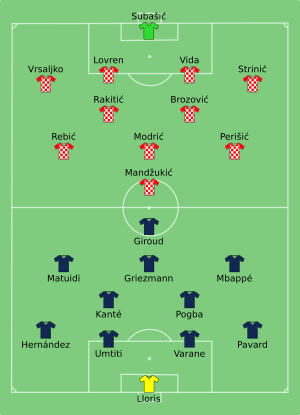 |
|
|||||||||||||||||||||||||||||||||||||||||||||||||||||||||||||||||||||||||||||||||||||||||||||||||||||||||||||||||||||||||||||
|
Man of the Match: Referees and Officials: |
Match rules
|
Match Statistics
|
|
|
After the Match
France became the sixth country to win the World Cup more than once. Their manager, Didier Deschamps, became only the third person to win the World Cup as both a player and a manager. The final was the highest-scoring World Cup final since 1966.
After the game, the medals were given to both teams. FIFA president Gianni Infantino handed the World Cup trophy to France's captain, Hugo Lloris. As he lifted the trophy, the tournament's official song, "Live It Up", played.
Croatia's captain, Luka Modrić, won the Golden Ball award for being the best player of the whole tournament. Antoine Griezmann won the Bronze Ball and the Silver Boot award for his four goals and two assists. Kylian Mbappé won the Best Young Player award.
Didier Deschamps talked about winning the World Cup again. He said it was just as beautiful and powerful as when he won it as a player in 1998. Griezmann said he was "really happy" and that it was a very tough match. Croatia's manager, Zlatko Dalić, congratulated France but still felt the penalty decision was wrong. Modrić was proud of his team's achievement, even though they lost.
Huge crowds celebrated in France. About 90,000 people gathered at the Eiffel Tower fanzone in Paris. An estimated one million people celebrated on the Champs-Élysées. The Paris Metro system even temporarily renamed some stations to honor the team.
On July 16, over 550,000 fans welcomed the Croatian team home in their capital city, Zagreb. This was the biggest public gathering in Croatia's history. The players were also welcomed in their hometowns.
Watching the Final Around the World
FIFA estimated that 1.12 billion people watched the final match globally. This included 884 million watching on TV and 232 million watching online or at public events.
In France, the final was the most-watched event ever on French television. About 26.1 million viewers tuned in. In Croatia, over 1.5 million people watched, which is more than 38% of their population! In the United States, the match had 16.6 million viewers combined on English and Spanish channels. In China, 56 million people watched on state TV, making it the most-watched sporting event there since the 2008 Beijing Olympics.
Overall, more than 160 million people watched the final in 20 different European countries.
See also
 In Spanish: Anexo:Final de la Copa Mundial de Fútbol de 2018 para niños
In Spanish: Anexo:Final de la Copa Mundial de Fútbol de 2018 para niños
- Croatia at the FIFA World Cup
- France at the FIFA World Cup
 | Dorothy Vaughan |
 | Charles Henry Turner |
 | Hildrus Poindexter |
 | Henry Cecil McBay |


